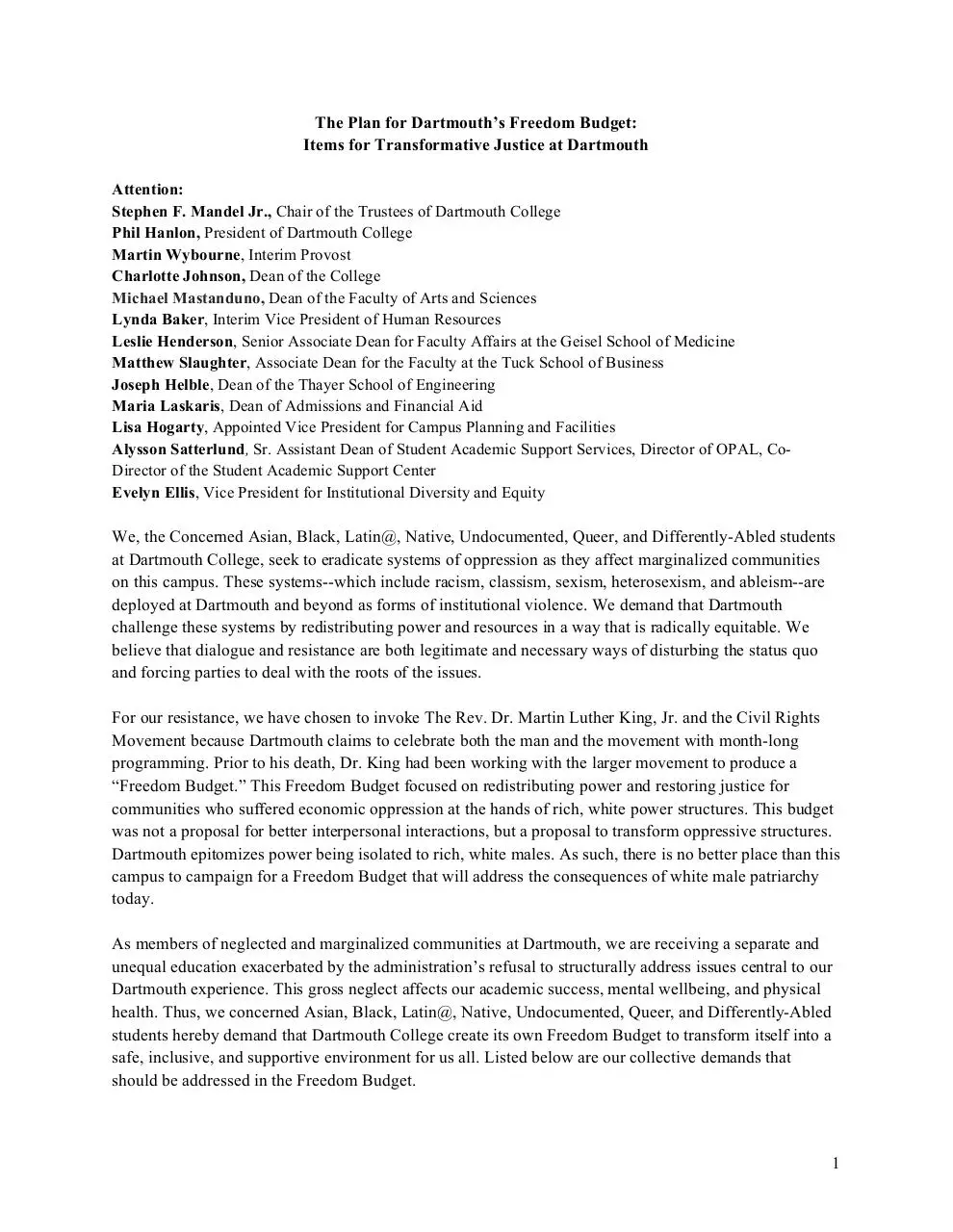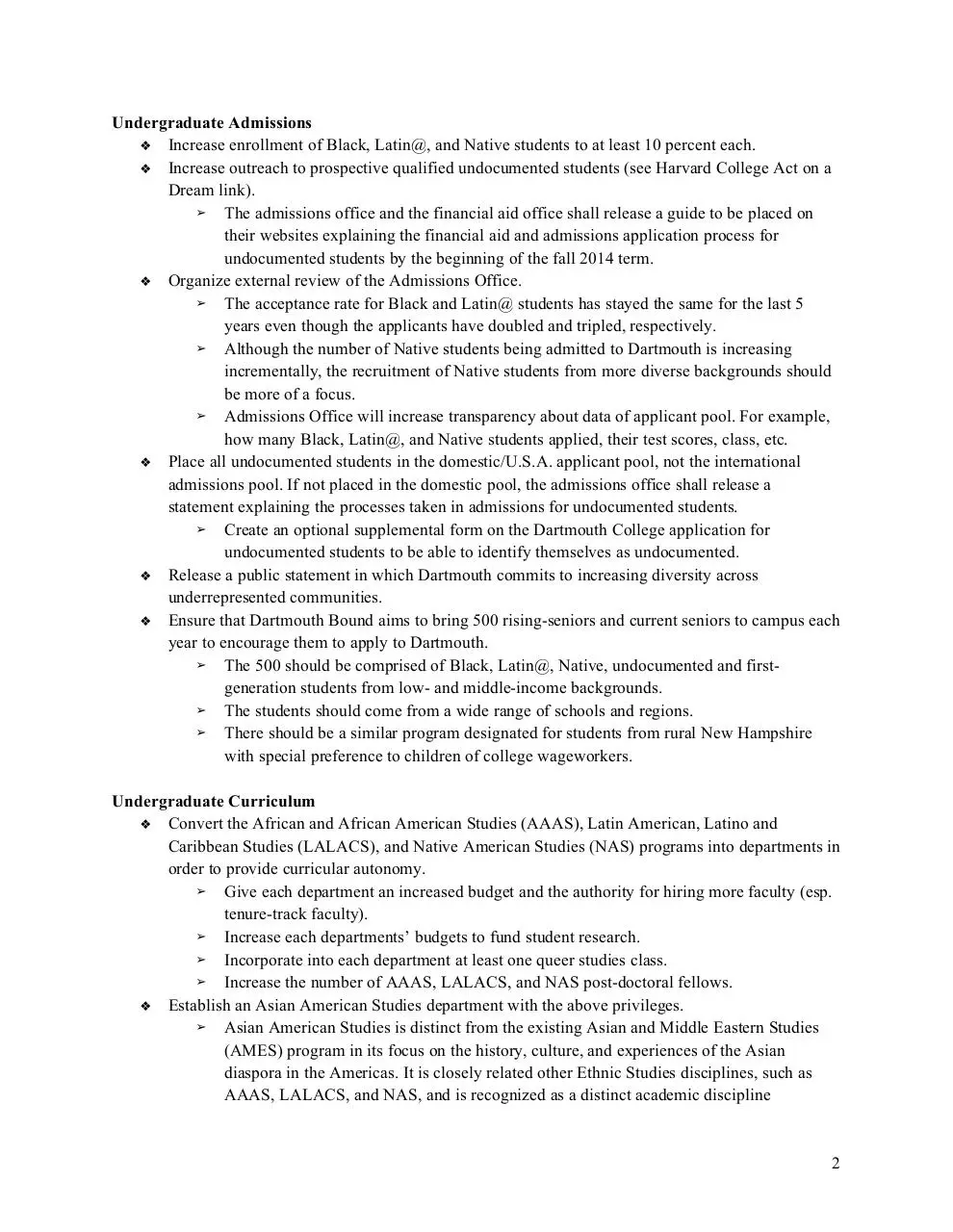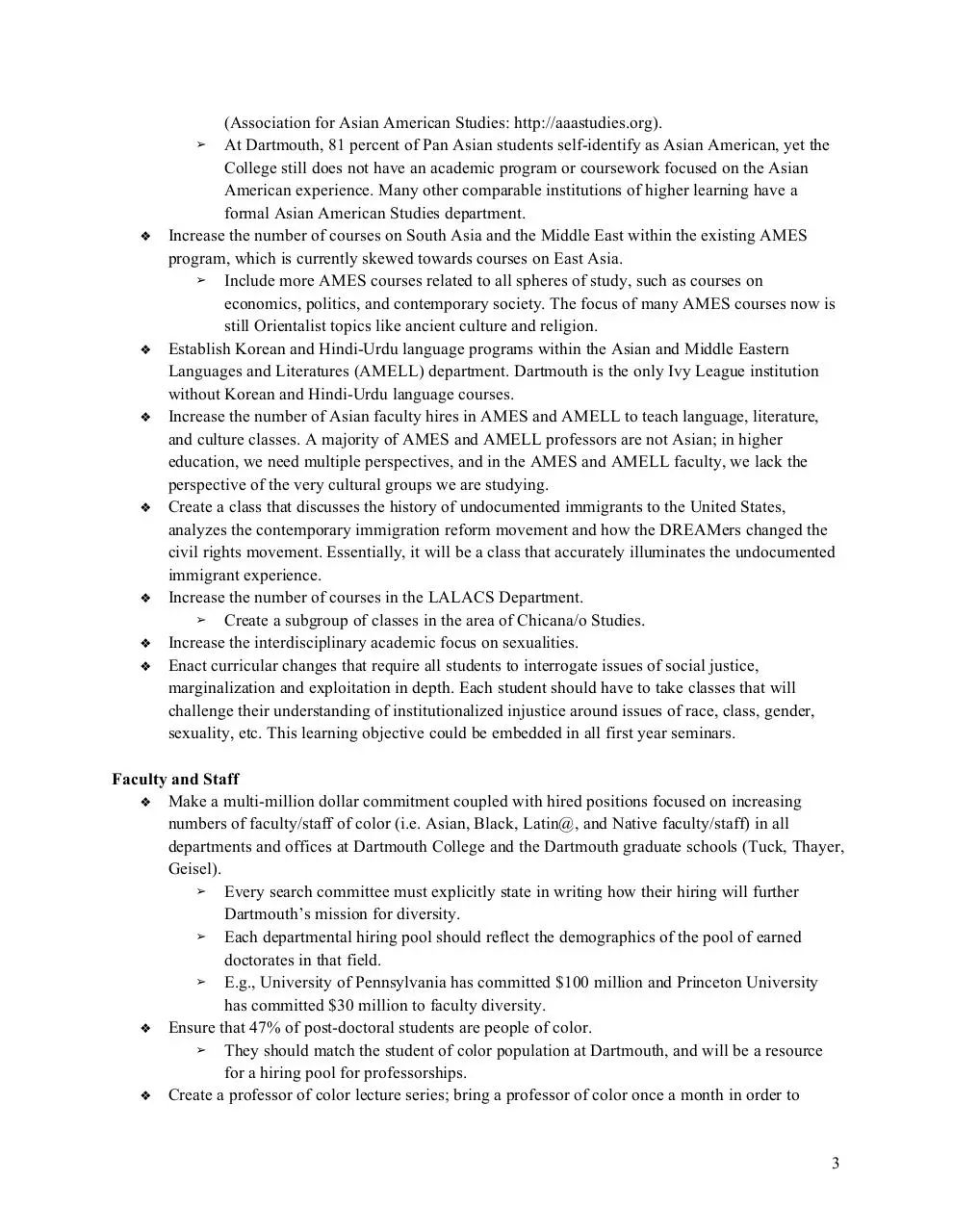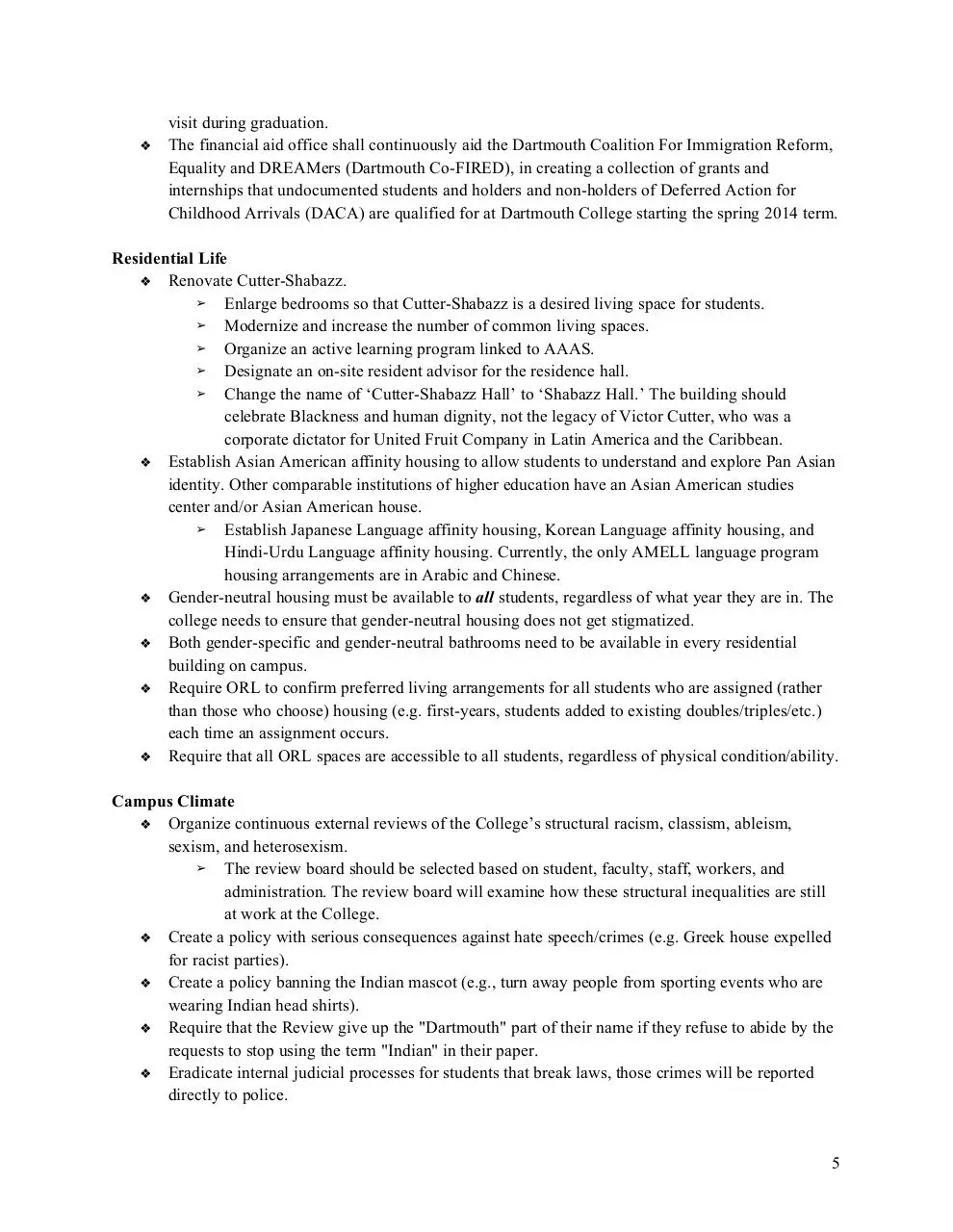Dartmouth Freedom Budget Plan (PDF)
File information
Title: Microsoft Word - CollectiveDemands-1.docx
Author: Celeste Winston
This PDF 1.3 document has been generated by Word / Mac OS X 10.7.5 Quartz PDFContext, and has been sent on pdf-archive.com on 18/04/2014 at 08:20, from IP address 162.210.x.x.
The current document download page has been viewed 1079 times.
File size: 151.59 KB (8 pages).
Privacy: public file





File preview
The Plan for Dartmouth’s Freedom Budget:
Items for Transformative Justice at Dartmouth
Attention:
Stephen F. Mandel Jr., Chair of the Trustees of Dartmouth College
Phil Hanlon, President of Dartmouth College
Martin Wybourne, Interim Provost
Charlotte Johnson, Dean of the College
Michael Mastanduno, Dean of the Faculty of Arts and Sciences
Lynda Baker, Interim Vice President of Human Resources
Leslie Henderson, Senior Associate Dean for Faculty Affairs at the Geisel School of Medicine
Matthew Slaughter, Associate Dean for the Faculty at the Tuck School of Business
Joseph Helble, Dean of the Thayer School of Engineering
Maria Laskaris, Dean of Admissions and Financial Aid
Lisa Hogarty, Appointed Vice President for Campus Planning and Facilities
Alysson Satterlund, Sr. Assistant Dean of Student Academic Support Services, Director of OPAL, CoDirector of the Student Academic Support Center
Evelyn Ellis, Vice President for Institutional Diversity and Equity
We, the Concerned Asian, Black, Latin@, Native, Undocumented, Queer, and Differently-Abled students
at Dartmouth College, seek to eradicate systems of oppression as they affect marginalized communities
on this campus. These systems--which include racism, classism, sexism, heterosexism, and ableism--are
deployed at Dartmouth and beyond as forms of institutional violence. We demand that Dartmouth
challenge these systems by redistributing power and resources in a way that is radically equitable. We
believe that dialogue and resistance are both legitimate and necessary ways of disturbing the status quo
and forcing parties to deal with the roots of the issues.
For our resistance, we have chosen to invoke The Rev. Dr. Martin Luther King, Jr. and the Civil Rights
Movement because Dartmouth claims to celebrate both the man and the movement with month-long
programming. Prior to his death, Dr. King had been working with the larger movement to produce a
“Freedom Budget.” This Freedom Budget focused on redistributing power and restoring justice for
communities who suffered economic oppression at the hands of rich, white power structures. This budget
was not a proposal for better interpersonal interactions, but a proposal to transform oppressive structures.
Dartmouth epitomizes power being isolated to rich, white males. As such, there is no better place than this
campus to campaign for a Freedom Budget that will address the consequences of white male patriarchy
today.
As members of neglected and marginalized communities at Dartmouth, we are receiving a separate and
unequal education exacerbated by the administration’s refusal to structurally address issues central to our
Dartmouth experience. This gross neglect affects our academic success, mental wellbeing, and physical
health. Thus, we concerned Asian, Black, Latin@, Native, Undocumented, Queer, and Differently-Abled
students hereby demand that Dartmouth College create its own Freedom Budget to transform itself into a
safe, inclusive, and supportive environment for us all. Listed below are our collective demands that
should be addressed in the Freedom Budget.
1
Undergraduate Admissions
❖ Increase enrollment of Black, Latin@, and Native students to at least 10 percent each.
❖ Increase outreach to prospective qualified undocumented students (see Harvard College Act on a
Dream link).
➢ The admissions office and the financial aid office shall release a guide to be placed on
their websites explaining the financial aid and admissions application process for
undocumented students by the beginning of the fall 2014 term.
❖ Organize external review of the Admissions Office.
➢ The acceptance rate for Black and Latin@ students has stayed the same for the last 5
years even though the applicants have doubled and tripled, respectively.
➢ Although the number of Native students being admitted to Dartmouth is increasing
incrementally, the recruitment of Native students from more diverse backgrounds should
be more of a focus.
➢ Admissions Office will increase transparency about data of applicant pool. For example,
how many Black, Latin@, and Native students applied, their test scores, class, etc.
❖ Place all undocumented students in the domestic/U.S.A. applicant pool, not the international
admissions pool. If not placed in the domestic pool, the admissions office shall release a
statement explaining the processes taken in admissions for undocumented students.
➢ Create an optional supplemental form on the Dartmouth College application for
undocumented students to be able to identify themselves as undocumented.
❖ Release a public statement in which Dartmouth commits to increasing diversity across
underrepresented communities.
❖ Ensure that Dartmouth Bound aims to bring 500 rising-seniors and current seniors to campus each
year to encourage them to apply to Dartmouth.
➢ The 500 should be comprised of Black, Latin@, Native, undocumented and firstgeneration students from low- and middle-income backgrounds.
➢ The students should come from a wide range of schools and regions.
➢ There should be a similar program designated for students from rural New Hampshire
with special preference to children of college wageworkers.
Undergraduate Curriculum
❖ Convert the African and African American Studies (AAAS), Latin American, Latino and
Caribbean Studies (LALACS), and Native American Studies (NAS) programs into departments in
order to provide curricular autonomy.
➢ Give each department an increased budget and the authority for hiring more faculty (esp.
tenure-track faculty).
➢ Increase each departments’ budgets to fund student research.
➢ Incorporate into each department at least one queer studies class.
➢ Increase the number of AAAS, LALACS, and NAS post-doctoral fellows.
❖ Establish an Asian American Studies department with the above privileges.
➢ Asian American Studies is distinct from the existing Asian and Middle Eastern Studies
(AMES) program in its focus on the history, culture, and experiences of the Asian
diaspora in the Americas. It is closely related other Ethnic Studies disciplines, such as
AAAS, LALACS, and NAS, and is recognized as a distinct academic discipline
2
❖
❖
❖
❖
❖
❖
❖
(Association for Asian American Studies: http://aaastudies.org).
➢ At Dartmouth, 81 percent of Pan Asian students self-identify as Asian American, yet the
College still does not have an academic program or coursework focused on the Asian
American experience. Many other comparable institutions of higher learning have a
formal Asian American Studies department.
Increase the number of courses on South Asia and the Middle East within the existing AMES
program, which is currently skewed towards courses on East Asia.
➢ Include more AMES courses related to all spheres of study, such as courses on
economics, politics, and contemporary society. The focus of many AMES courses now is
still Orientalist topics like ancient culture and religion.
Establish Korean and Hindi-Urdu language programs within the Asian and Middle Eastern
Languages and Literatures (AMELL) department. Dartmouth is the only Ivy League institution
without Korean and Hindi-Urdu language courses.
Increase the number of Asian faculty hires in AMES and AMELL to teach language, literature,
and culture classes. A majority of AMES and AMELL professors are not Asian; in higher
education, we need multiple perspectives, and in the AMES and AMELL faculty, we lack the
perspective of the very cultural groups we are studying.
Create a class that discusses the history of undocumented immigrants to the United States,
analyzes the contemporary immigration reform movement and how the DREAMers changed the
civil rights movement. Essentially, it will be a class that accurately illuminates the undocumented
immigrant experience.
Increase the number of courses in the LALACS Department.
➢ Create a subgroup of classes in the area of Chicana/o Studies.
Increase the interdisciplinary academic focus on sexualities.
Enact curricular changes that require all students to interrogate issues of social justice,
marginalization and exploitation in depth. Each student should have to take classes that will
challenge their understanding of institutionalized injustice around issues of race, class, gender,
sexuality, etc. This learning objective could be embedded in all first year seminars.
Faculty and Staff
❖ Make a multi-million dollar commitment coupled with hired positions focused on increasing
numbers of faculty/staff of color (i.e. Asian, Black, Latin@, and Native faculty/staff) in all
departments and offices at Dartmouth College and the Dartmouth graduate schools (Tuck, Thayer,
Geisel).
➢ Every search committee must explicitly state in writing how their hiring will further
Dartmouth’s mission for diversity.
➢ Each departmental hiring pool should reflect the demographics of the pool of earned
doctorates in that field.
➢ E.g., University of Pennsylvania has committed $100 million and Princeton University
has committed $30 million to faculty diversity.
❖ Ensure that 47% of post-doctoral students are people of color.
➢ They should match the student of color population at Dartmouth, and will be a resource
for a hiring pool for professorships.
❖ Create a professor of color lecture series; bring a professor of color once a month in order to
3
❖
❖
❖
❖
❖
❖
❖
❖
❖
❖
❖
❖
expose the Dartmouth community to a wide range of ideas (e.g., University of Pennsylvania).
All departments will outline and make public how their hiring and tenure processes work.
Because professors of color are often called upon for mentorship and service work, tenure
processes should recognize these forms of labor.
Departments that do not have womyn or people of color will be considered in crisis and must take
urgent and immediate action to right the injustice.
Human resources will publish demographics from each applicant pool when a search commences.
Departments should explicitly notify campus before, during, and after a search for a new hire.
There will be required exit interviews for departing faculty conducted by Human Resources.
Ensure that department cultures are inclusive of diverse faculty and student bodies
➢ All professors will be required to be trained in not only cultural competency but also the
importance of social justice in their day-to-day work.
Mandate sensitivity training for all faculty to reduce incidents of racism, sexism, heterosexism,
classism, and ableism by faculty towards students.
Significantly increase the budget of the Black Caucus and create equivalent advocacy groups to
support staff, faculty, and administrators of color.
➢ These groups are needed to support people of color who work for the College and who
support students in ways not asked of their white counterparts.
Increase staff benefits and support.
➢ Increase wage and healthcare benefits (including lowering the cost of co-pays).
➢ Pledge to not subcontract any more jobs.
Ask staff/faculty to use students’ and employees’ preferred gender pronouns.
Provide full transgender health coverage for all employees - without pressure to agree to
particular measures. We demand body and gender self-determination.
Expand the pool of professionals of color and womyn in Student Accessibility Services, Dick’s
House, and Safety and Security.
Financial Aid
❖ Organize external reviews of the Financial Aid office.
❖ Better and make more transparent Dartmouth’s financial aid policy for middle class students.
➢ E.g., Harvard’s financial aid policy asks that families with incomes above $120,000 and
below $180,000, and with assets typical for these income levels, pay 10 percent of their
incomes.
❖ Include student advocates on the committee to review special circumstances in financial aid cases.
❖ Train all financial aid officers to address the wide range of needs and conversations in relation to
students, including undocumented students.
❖ Eliminate student contribution for students on full financial aid and for non-DACA (Deferred
Action for Childhood Arrivals) holders.
❖ Allow undocumented students to be able to work similarly to international students.
❖ Expand financial aid to cover extraneous FSP costs.
❖ Lower the cost of transferring credits.
❖ Increase and redesign the Fund for Educational Enrichment to cover expenses incurred by
graduate school and job applications/interviews.
❖ Creating a budget that subsidizes travel costs for students whose families cannot afford to come
4
❖
visit during graduation.
The financial aid office shall continuously aid the Dartmouth Coalition For Immigration Reform,
Equality and DREAMers (Dartmouth Co-FIRED), in creating a collection of grants and
internships that undocumented students and holders and non-holders of Deferred Action for
Childhood Arrivals (DACA) are qualified for at Dartmouth College starting the spring 2014 term.
Residential Life
❖ Renovate Cutter-Shabazz.
➢ Enlarge bedrooms so that Cutter-Shabazz is a desired living space for students.
➢ Modernize and increase the number of common living spaces.
➢ Organize an active learning program linked to AAAS.
➢ Designate an on-site resident advisor for the residence hall.
➢ Change the name of ‘Cutter-Shabazz Hall’ to ‘Shabazz Hall.’ The building should
celebrate Blackness and human dignity, not the legacy of Victor Cutter, who was a
corporate dictator for United Fruit Company in Latin America and the Caribbean.
❖ Establish Asian American affinity housing to allow students to understand and explore Pan Asian
identity. Other comparable institutions of higher education have an Asian American studies
center and/or Asian American house.
➢ Establish Japanese Language affinity housing, Korean Language affinity housing, and
Hindi-Urdu Language affinity housing. Currently, the only AMELL language program
housing arrangements are in Arabic and Chinese.
❖ Gender-neutral housing must be available to all students, regardless of what year they are in. The
college needs to ensure that gender-neutral housing does not get stigmatized.
❖ Both gender-specific and gender-neutral bathrooms need to be available in every residential
building on campus.
❖ Require ORL to confirm preferred living arrangements for all students who are assigned (rather
than those who choose) housing (e.g. first-years, students added to existing doubles/triples/etc.)
each time an assignment occurs.
❖ Require that all ORL spaces are accessible to all students, regardless of physical condition/ability.
Campus Climate
❖ Organize continuous external reviews of the College’s structural racism, classism, ableism,
sexism, and heterosexism.
➢ The review board should be selected based on student, faculty, staff, workers, and
administration. The review board will examine how these structural inequalities are still
at work at the College.
❖ Create a policy with serious consequences against hate speech/crimes (e.g. Greek house expelled
for racist parties).
❖ Create a policy banning the Indian mascot (e.g., turn away people from sporting events who are
wearing Indian head shirts).
❖ Require that the Review give up the "Dartmouth" part of their name if they refuse to abide by the
requests to stop using the term "Indian" in their paper.
❖ Eradicate internal judicial processes for students that break laws, those crimes will be reported
directly to police.
5
❖
❖
❖
Expel any students convicted of sexual assault/rape.
Increase support (including counseling services and legal aid) for survivors of sexual assault/rape.
Allocate funding for the formation of an external commission of higher education professionals
and scholars whose task is to:
➢ Evaluate the status of Greek life at Dartmouth as it relates to sexual assault.
➢ Examine the ways Greek life adversely affects womyn, people of color, and low-income
students.
➢ Publish a summary of current state of affairs.
➢ Give recommendations for improvement, including a timeline for completion.
Advising and Support
❖ Increase OPAL’s budget to support student organizations that represent Asian, Black, Latin@,
Native, Undocumented, Queer, and Differently-Abled Students.
➢ Increased funding for OPAL programs in leadership development, community building,
and co-curricular programming.
➢ Support OPAL in creating an institutional memory for respective underrepresented
communities.
❖ Pre-orientation programing
➢ Increase budget and support for FYSEP and pre-orientation STEM program for students
who come from under-resourced backgrounds.
❖ Release a statement of recognition on the existence of undocumented students at Dartmouth and
support for their community.
➢ A letter from the President shall express commitment to providing the resources (stated in
these demands) necessary for the success of Dartmouth’s undocumented students. This
statement shall be released during the Dartmouth Co-FIRED’s event on “Dropping the ‘I’
Word Campaign” in the second week of Spring Term 2014.
❖ Release a statement of assurance from the Office of Visa and Immigration Services (OVIS)
stating that in case of deportation/ immigration proceedings undocumented students at Dartmouth
will be defended, acknowledged, and supported by the college.
❖ Provide pro bono legal assistance and financial assistance at Dartmouth College for
undocumented students to better understand each of their unique legal statuses, as well as for reapplying for DACA and other immigration procedures and counseling.
❖ Mandate training for all staff and faculty (across all departments) that adequately prepares them
to aid undocumented students in regards to future professional and academic plans.
➢ OVIS & International Student Advising Office is trained, prepared and ready with the
necessary resources for undocumented students by one year from the release of this
document.
❖ Provide more US-based internship, LSA and FSP opportunities for undocumented students due to
legal and physical barriers.
❖ Formally integrate the Student Accessibility Services (SAS) with the Dean’s Office.
➢ Provide funding through SAS and Dick’s House for psychiatric and learning disability
testing, etc.
➢ Move from a crisis-based advising praxis to a wellness-based advising praxis.
❖ Provide more information, advising, and opportunities in the Center for Professional
6
❖
❖
❖
Development (CPD) for students interested in non-finance and non-marketing careers.
Institutionalize Latina/o Heritage Month.
Increase funding from the College or the President's Office for the Dartmouth College Powwow.
➢ The amount of funding that the President's Office gives to the Powwow has remained the
same for over a decade.
Transform the Native American Program
➢ Better the Native American Program to provide student support services to Native
students at Dartmouth, in order to counter the dropping retention rates and fragmentation.
➢ Create a Native American Cultural Center (e.g. Stanford University) with a dean,
associate director, graduate recruitment and retention coordinator positions in the Native
American Program.
➢ Increase funding for the Native American Pre-Orientation Program.
Miscellaneous
❖ Every Dartmouth student should be taught and made aware that the land they reside on is
Abenaki homeland. This should take place during all major Dartmouth ceremonies, especially
during orientation and commencement.
❖ Ban the use of “illegal aliens”, “illegal immigrants”, “wetback”, and any racially charged term on
Dartmouth-sanctioned programming materials and locations.
➢ The library search catalog system shall use undocumented instead of “illegal” in
reference to immigrants.
➢ Institutionalized in the Dartmouth handbook for students, faculty, and staff.
❖ Both gender-specific and gender-neutral facilities (bathrooms and changing areas/locker rooms)
need to be available in every building on campus.
❖ Safe rides not only for individuals, but for groups too. People who are marginalized on this
campus are not automatically safe just because they’re walking in a group.
❖ When students and their families pay tuition, they should be allowed to decide what their
“Student Activities Fee” is used for.
❖ All male-female checkboxes should be replaced with write-in boxes to make forms, surveys and
applications more inclusive for trans*, two-spirit, agender, gender-nonconforming and
genderqueer folks. This should be a campus-wide policy.
The age of complacency and apathy toward change at Dartmouth College ends now. By March 24, 2014
(the first day of the 2014 Spring Term), the Dartmouth administration needs to publicly respond to each
item raised on this document with its exact commitment to each one of its demands. We also request that,
by that day, a timetable and point people are designated for the above commitments. Finally, items that
require funds will have a monetary commitment in the 2014-2015 fiscal budget. If the Dartmouth
administration does not respond by the indicated time, those who believe in freedom will be forced to
physical action. As mentioned before, this proposal is not about interpersonal interactions, but about
restoring justice in an institution beset with a history of discriminatory and oppressive practices. This list
of demands does not promise to end oppression; but with this list, Dartmouth College can begin to build
itself anew. There have been countless task forces and committee reports on the issues addressed in this
budget, and many of our demands come from the recommendations made in the reports. Each report
comes from one- to two-year College-supported research but the College has implemented virtually none
7
of these recommendations. This apathy amounts to nothing less than injustice, especially for an institution
that calls itself “the College on the hill.” If on that hill, queer and differently-abled people, womyn, and
people of color are denied access to the wealth, social mobility, employment, and safety—which is
presently and historically already secured for white men—then the College on the hill is a shameful sight
to see. It is because Dartmouth stands on a hill that it must be transformed; the eyes of the world are on
this place. Dartmouth can and must be a change agent.
We demand that President Hanlon, affiliated offices, and those addressed in this letter reply to us via The
Dartmouth newspaper by March 24, 2014. We invite responses, engagement, and questions to
dartmouthfreedombudget@gmail.com.
Resources
1. Alumni Council of Dartmouth College. 2013. Report of the Ad Hoc Committee on Diversity and
Inclusion.
<http://alumni.dartmouth.edu/leadership/council/media/Alumni_Council/ahcdi_report_final.pdf>
2. Dartmouth College Factbook. 2012. Faculty.
<http://www.dartmouth.edu/~oir/pdfs/facultytotalinstitution_12.pdf>
3. Princeton University. 2013. Report of the Trustee Ad Hoc Committee on Diversity.
<http://www.princeton.edu/reports/2013/diversity/report/PU-report-on-diversity.pdf >
4. Brill, Emily. 2013. Princeton University endorses plan to increase diversity among faculty, staff
and graduate students. Accessed from:
<http://www.nj.com/mercer/index.ssf/2013/09/princeton_university_endorses_plan_to_increase_
diversity_among_faculty_staff_and_graduate_student_bo.html>
5. Report of Committee on Student Safety and Accountability at Dartmouth. 2013.
<http://www.wwu.edu/eoo/docs/Best%20Practices_Recruiting%20and%20Retaining%20Staff%2
0of%20Color.pdf>
6. Harvard College Act on a Dream. 2012. <http://www.actonadream.org/>
8
Download Dartmouth Freedom Budget Plan
Dartmouth_Freedom_Budget_Plan.pdf (PDF, 151.59 KB)
Download PDF
Share this file on social networks
Link to this page
Permanent link
Use the permanent link to the download page to share your document on Facebook, Twitter, LinkedIn, or directly with a contact by e-Mail, Messenger, Whatsapp, Line..
Short link
Use the short link to share your document on Twitter or by text message (SMS)
HTML Code
Copy the following HTML code to share your document on a Website or Blog
QR Code to this page

This file has been shared publicly by a user of PDF Archive.
Document ID: 0000157745.